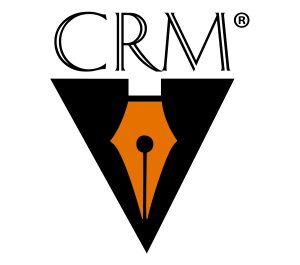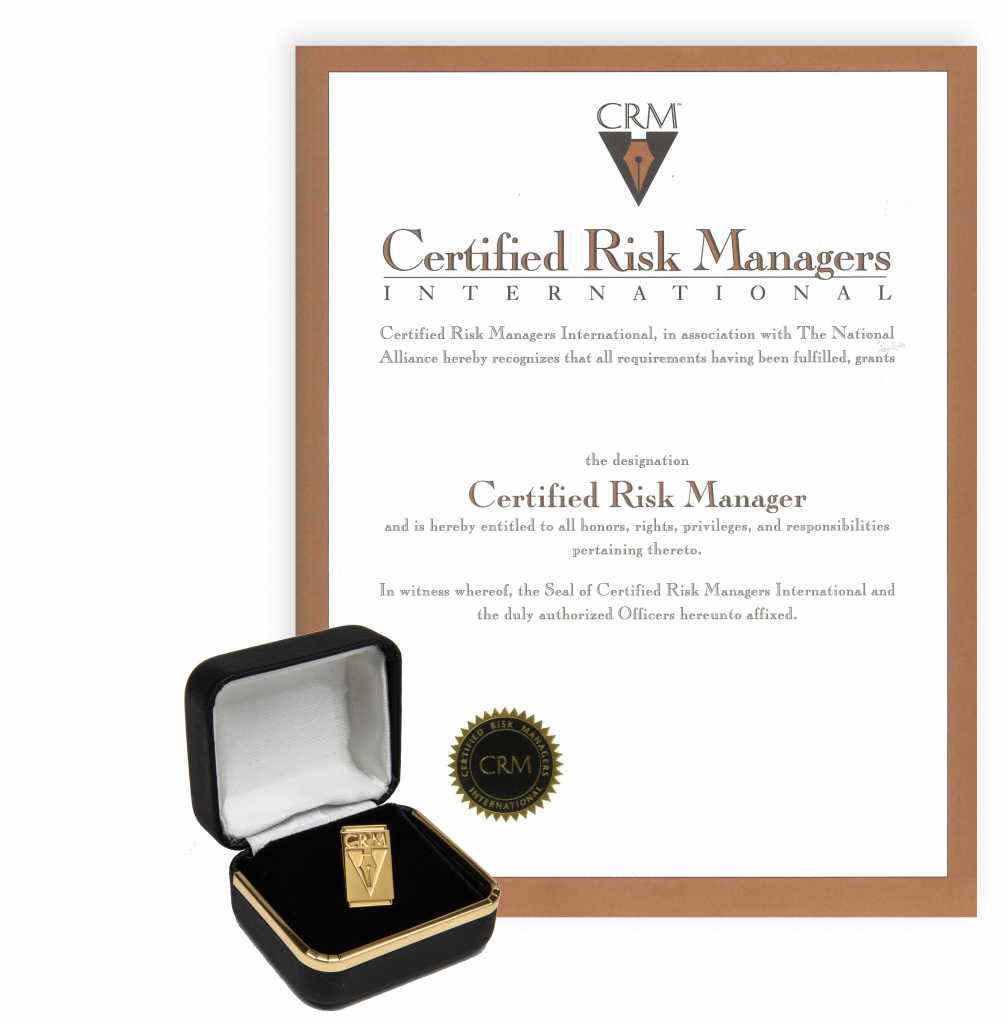

Risk Managers are in high demand! Distinguish yourself from the crowd and get the credential that sets you apart—Certified Risk Manager (CRM).
Risk Managers don’t leave anything to chance! Participate in the program that gives you a dependable advantage in the demanding field of risk management—the CRM Program.
Risk management is one of the many responsibilities of a variety of professionals, including accountants, attorneys, financial and insurance professionals, and specialists in loss control. If you are one of these practitioners, you may be ready to take courses or pursue your CRM designation. If you:
- are a risk manager, financial or insurance professional, licensed agent, broker, accountant, or solicitor,
- have at least two years of full-time experience in the insurance industry or in risk management,
- have taken a CRM course through the UACRM program, or
- have served as a full-time risk management or insurance faculty member at an accredited college or university,
You’ll benefit from attending CRM courses—gaining expertise and credibility with your organization and in the risk management community.
Earning the CRM designation demonstrates your expertise and shows that you are a part of an international network of respected and dedicated risk management professionals.
Earn your designation quicker with a Subscription Membership!
These are the times clients and colleagues need you the most.
Risk management is one of the many responsibilities of a variety of professionals, including accountants, attorneys, financial and insurance professionals, and specialists in loss control. If you’re one of these practitioners, you may be ready to take courses or pursue your instructor-led CRM designation online.
CRM Courses
Courses are listed in recommended order.
Get the skills needed to correctly identify exposures by building a firm foundation in the fundamentals of risk management.
This 16-hr course provides you with the resources to accurately identify exposures—the first and most crucial stage in the risk management process. Insurance professionals interested in earning the CRM designation are advised to enroll in this course first.
Topics Covered:
- Introduction to Risk Management
- Risk Management and the Organization
- Introduction to Risk Identification
- Risk Identification Methods – Self-Administered Tools
- Analytic Risk Identification Methods
- Financial Statement Analysis
- Introduction to Enterprise Risk Management
Register
State CE not approved in New Jersey unless you hold a CIC and/or CISR designation.
You’ll acquire a facility with the analysis and measurement of exposures and loss data that is fundamental to risk management. It’s recommended that you take this Analysis of Risk course before Financing of Risk.
This 16-hour course includes application exercises.
Topics Covered:
- Introduction to Analysis
- Qualitative Analysis
- Quantitative Analysis: Tools
- Quantitative Analysis: Forecasting
- Time Value of Money Concepts
- Risk Analysis- Practical Application
Register
Take this 16-hour course to gain proficiency in the application of risk control techniques—safety, alternative dispute resolution, employment practices liability, and crisis management. It centers on the latest trends in risk control for cyber, fleet, and ergonomic risks and provides crisis management, disaster planning, and claims management concepts. This 16-hour course includes application exercises.
New and Updated! Topics covered:
- Risk Control and Mitigation – Human Resources
- Risk Control and Mitigation – Property & Liability
- Crisis & Disaster Planning
- Claims Management
Register
Financing of Risk is often an intricate and complex task. In this course, you will compare various financing options: non-insurance transfer, guaranteed cost plans, retro plans, dividend plans, pools, and various types of captives. You will learn how to deliver the message to management in present value dollars. We recommend that this course be taken after Analysis of Risk.
This 16-hour course includes application exercises.
Topics Covered:
Risk Financing Fundamentals
- Risk Financing Program Decision Making
- Methods for Risk Financing
- Risk Financing Team
- Alternative Risk Transfer
Register
This updated and revised course consolidates what you have learned in other CRM courses. For this reason, it is suggested that you take this course last. Practice of Risk Management also helps you tackle the daily managerial and organizational requirements of risk managers and consultants. New topics include International and Multinational Risks and Compliance and Governance.
This 16-hour course includes application exercises.
New and Revised! Topics Covered:
- The Risk Manager
- The Risk Management Network
- Information Technology for Risk Managers
- Total Cost Of Risk
- Due Diligence
- Managing the Risk of Intangible Assets
- Executive Risk
- International & Multinational Risks
Register
Learning Options
Instructor-Led Online
- Live, instructor-led webinars - Interact and chat with your instructor, study real-world scenarios.
- Instruction by the same expert faculty—with the ease of a webinar
- Convenience—use your computer, tablet, or cell phone
- 16 Hours of Webinars, delivered over 2-4 Weeks.
- Extended study period for exam-takers
In-Person Classroom
- Each course is two days of instruction, followed by an optional 2.5-hour exam- passing the exam is required to earn the designation.
- Expert, nationally recognized faculty who provide concrete examples and scenarios
- Helpful notebooks and other resource materials
- More than 300 courses are conducted on-site each year in major cities throughout the U.S. and Puerto Rico
- Train your entire team and save money by bringing National Alliance programs to your corporate or agency location—contact Business Development at 800-633-2165 or email alliance@scic.com for details.
Online learning is easy to use and engaging
Designation Requirements

Earning the CRM designation demonstrates your expertise and dedication to the risk management industry.
Earning the Designation
To earn the designation, take all five CRM courses and pass the corresponding exams within five calendar years after you pass your first CRM exam.
Earning Multiple Designations
You can also achieve the CIC designation by completing any four CIC courses plus one CRM course. This option allows you to earn both the CRM and CIC designations by completing only nine courses—the four CIC courses of your choice, plus all five CRM courses.
How to Keep Your Designation
After receiving the CRM designation, no further examinations are required. To keep your designation current, you’ll need to complete any one of these yearly update options.
- James K. Ruble Seminar
- PROFocus Series Seminar
- MEGA Seminar
- Dynamics of Selling
- Dynamics of Sales Management
- Dynamics of Company/Agency Relationships
- Certified Risk Manager (CRM) course
- Certified Personal Risk Manager (CPRM) course
- Certified Insurance Counselor (CIC) course
A status available to CRMs who are ready to retire, but not ready to give up the designation for which they worked so diligently and maintained for so many years. CRM Emeritus status is maintained with annual dues payment and no annual update is required. The CRM Emeritus status guidelines are:
- Candidates must be retired from the insurance or risk management industry
- years held designation plus age must equal 70 or greater, and
- CRMs must be dues-paid members in good standing.
Those are the technical requirements; however, it means much more than that to be an Emeritus CRM. These professionals are committed to continuing education and to the community they have helped to build and foster. They continue to support our efforts to broaden the opportunities to learn and to succeed.
If you have any questions about the Emeritus status or how to apply, please call Program Services at 800-633-2165 for assistance.
In recognition of the many milestones and achievements CRMs have made in their successful careers, the CIC Board of Governors initiated the Tenured CRM status in 2023. Significant educational achievements and a record of maintaining your designation have broadened each individual’s substantial base of knowledge. Therefore, this special recognition of tenure has been granted to CRMs who have met the following criteria:
- Held the designation for 25 or more years,
- or CRMs who have not held the designation for 25+ years, but are 70 years old or older,
- Designation is in good standing,
- AND membership dues are current.
These CRMs will be eligible for tenured status and may maintain their designation by paying CRM dues every year and attending a qualified program every other year.
Best of all, tenured CRMs retain all of the rights and privileges of the designation and of their membership in the Society.
Benefits
Client Benefits
- Practical, real-world information that provides best-in-class knowledge and best-in-class protection.
- A well-designed and thorough profile of complex exposures and coverage remedies
- Your in-depth knowledge of current approaches in both personal and commercial lines

Agency/Company Benefits

- A professional and competitive advantage with a solid risk management plan in place
- A skilled and prepared risk manager leading the charge in protecting an organization’s assets and bottom-line
- Aggregated value of implementing ERM programs covering the downside and upside of risk
Participant Benefits
- An internationally recognized risk management designation
- Curriculum developed by practicing risk professionals and educators
- A comprehensive education in qualitative and quantitative tools
- An instructive overview of the 5 steps of risk management—identification of exposures, analysis of risk, risk control techniques, financing of risk, and administration
- The ability to identify and manage emerging and evolving risks
- Put-it-to-use-now risk management skills and solutions
- Real-life examples and experiences shared by instructors who are active in the field
- Implementation of the universal application of risk management concepts

CRM FAQs
The Certified Risk Manager (CRM) Program is a nationally recognized advanced education program for today’s risk management professionals. The CRM designation demonstrates a high level of technical knowledge and a commitment to the risk management field.
To earn the CRM designation, you must complete the five CRM courses and pass the corresponding exam for each course. You must pass all 2.5-hour exams within the five calendar years following the year you passed your first exam in order to earn the CRM designation.
The five CRM required courses are:
- Analysis of Risk
- Control of Risk
- Financing of Risk
- Practice of Risk Management
- Principles of Risk Management
Each course consists of 16 hours of instruction, including application exercises.
While there are no specific prerequisites for taking the CRM courses, it is recommended that participants in the program have at least two years of full-time experience in the insurance or risk management industry.
The CRM courses cover the current and complex technical knowledge and approaches necessary for risk management professionals. The CRM courses provide a comprehensive overview of the five steps of risk management—identification of exposures, analysis of risk, risk control techniques, financing of risk, and administration.
All courses are taught by expert-level professionals in the risk management field. In addition, all courses are continuously evaluated and revised to ensure that all material is current, relevant, and up to date.
- Principles of Risk Management focuses on tools that risk management professionals need to properly identify exposures, including at the enterprise level. The course also covers risk identification methods.
- Analysis of Risk explores risk analysis, quantitative analysis tools and forecasting, and risk modeling.
- Control of Risk focuses on solutions that prevent, eliminate, control and mitigate risk. The course covers risk control for the latest and most pertinent areas including cyber, fleet, ergonomic risks, as well as crisis and disaster planning.
- Risk Financing covers complex options, solutions, and methodologies, as well as the decision-making processes for financing risk.
- Practice of Risk Management provides an understanding of the daily managerial and organizational requirements of risk management, including on the enterprise level. Additional topics include executive risks, due diligence, multi-national and international risks, and compliance and governance.
To keep your CRM designation current, you must complete an annual continuing education course, although no additional exams are required. Several course options satisfy the annual update requirement, and you can choose between “dues required” and “NO dues required” courses.
The annual update options are as follows:
- NO dues required options:
- Any CRM course
- Any CPRM (Certified Personal Risk Manager) course
- Any CIC (Certified Insurance Counselor) course
- Dues required options:
- James K Ruble Seminar
- ProFocus Series Seminar
- Ruble MEGA Seminar
- Dynamics of Selling
- Dynamics of Sales Management
- Dynamics of Company/Agency Relationships
The CRM designation is especially suited for a variety of professionals in fields where risk management is a key responsibility. Accountants, attorneys, financial professionals, and risk management professionals are ideal candidates for the CRM designation. The CRM Program is also recommended for insurance professionals including insurance agents, brokers, commercial producers, senior underwriters, underwriting managers, commercial lines managers, and agency officers. Risk management and insurance faculty at accredited colleges and universities also pursue the CRM designation.
Recognized internationally, the CRM Program sets risk management practitioners apart as the designation demonstrates an advanced level of technical expertise. Earning the CRM boosts risk management professionals’ credibility within their own organizations and in the risk management community.
The CRM courses provide risk management practitioners with the tools and ability to identify and manage emerging and evolving risks in the current business and enterprise climate. As all courses are taught by practicing risk management professionals, the curriculum supports advanced, in-depth knowledge for risk management solutions that can be applied immediately.
The CRM Program originated in 1996 at the request of Certified Insurance Counselors (CICs) and National Alliance participants wanting to expand into the risk management field and provide additional services to their clients. It was created as a course of study providing five subjects of rigorous, practically oriented curriculum covering the risk management process. With risk management being one of the responsibilities of a variety of professionals, including attorneys, accountants, and financial professionals, the CRM designation is an excellent education opportunity. The designation is internationally recognized.
The CRM courses are available in a live classroom format, or in online, live, instructor-led webinars. Courses are taught by expert faculty who provide tangible, real-world examples and scenarios.
- The online program offers participants the flexibility of completing the course instruction via computer, tablet, or smartphone. For each online CRM course, 16 hours of webinars are delivered over a period of 2–4 weeks, with additional time to prepare for the 2.5-hour exam. All online course participants have the ability to interact and chat with the faculty instructors throughout the instruction period.
- In the live classroom format, each course includes two eight-hour days of instruction, followed by an optional 2.5-hour exam. Participants are required to pass the exam for all five courses to earn the CRM designation.